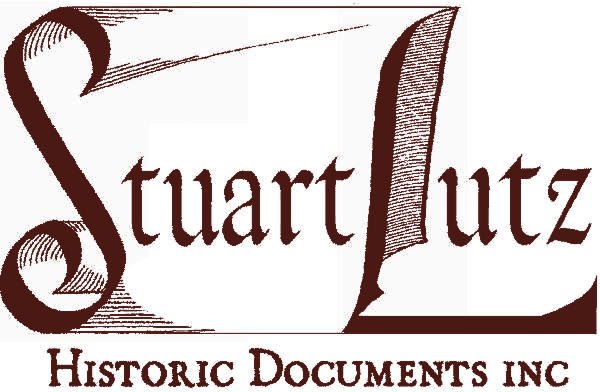| |
 (IRELAND - WILLIAM COBBETT) (IRELAND - WILLIAM COBBETT) |
|
|
|
|
| |
Price: $250.00 |
Stock# 2544 |
| |
THE BRITISH WRITER COBBETT PROPOSES LEGAL REFORMS IN THE IRISH CRIMINAL COURTS
WILLIAM COBBETT (1763-1835). Cobbett was a British author, reformer and farmer. He agitated for abolishing the poverty of farm workers and Catholic emancipation, even though he was not Catholic. He wrote in 1830 Rural Rides.
AM. 1pg. 8 ½” x 11”. No date. No place. A partial autograph manuscript in the handwriting of William Cobbett concerning legal reforms there: “to be found against any person for administering, tendering or taking such oath or engagement, to set out the words of such oath or engagement, and that it shall be sufficient to set forth therein the purport or object of such oath or engagement. VII. And whereas, in several instances, persons who have given information against persons accused of crimes in Ireland, have been murdered before trial of person accused, in order to prevent their giving evidence, and to effect the acquittal ‘of the accused’, be it declared and enacted That is any person who hath given or shall give information or examination upon oath against any person or persons for any offense against the laws, hath been or shall be, before the trial or trials of the person or persons respectively against whom such information or examination was given…violently put to death, or so maimed or forcibly carried away and secreted as not to be able to give evidence upon the trial of the person or persons against whom such information or examination was given; the information of such person or persons so taken on oath shall be admitted in all courts of justice in Ireland, as evidence upon trial or trials of such person or persons respectively against when such information or examination was given…”. The document has light staining to the right margin and is in fine condition. This has unusual legal content. |
2544
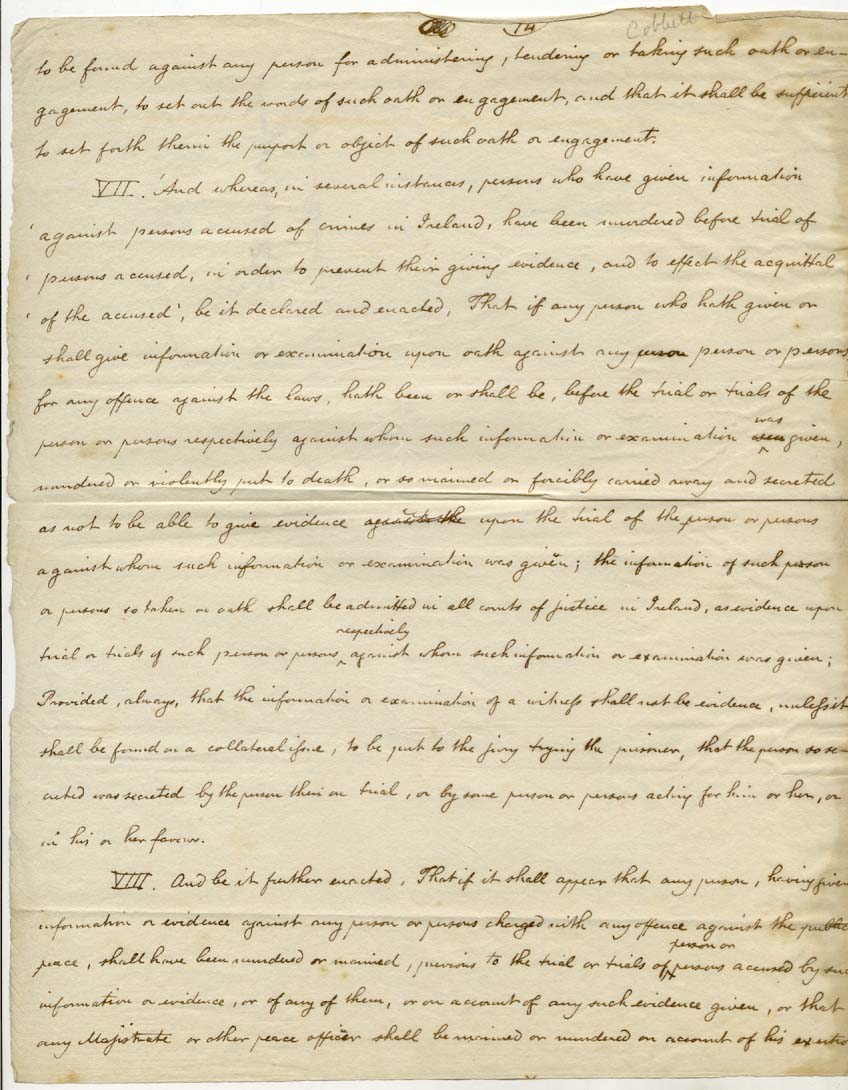
|
|
| |
| |
 (ISRAEL) (ISRAEL) |
|
|
|
|
| |
Price: $75.00 |
Stock# 4752 |
| |
(EARLY ISRAEL LETTER). TLS. 1pg. February 9, 1953. Jerusalem. A typed letter signed “Maddie” to a family in Princeton, New Jersey. She wrote on aerogram stationery “…We somehow find ourselves very busy, and I’m not doing as well as I should. We are now what we consider properly settled…I have gotten used to cooking on kerosene and to the ways of shopping here. The car is a wonderful asset, and it makes things much simpler for us…Many days it is warmer outside than inside. There kerosene heaters are a God send; and we keep them going a lot. My main culinary success so far has been blintzes made from powdered eggs…There is quite a bit of fish around…Last Shabbat we went to Rehovot. We spent the day with the Pekeris…We saw their Swedish pre-fab house which is being put up now and should be finished in a month or two…I am so far just limiting myself to running the house and seeing people in Jerusalem. I still tire rather quickly…In Tel Aviv and Haifa there are more things going on. I have spent a little time wandering around the gift shops of Jerusalem…I have a date to go to a special tree planting at the kibbutz Kiryat Anavim…one is still impressed as the first time by the quality of work being done.” It is in fine condition. |
4752
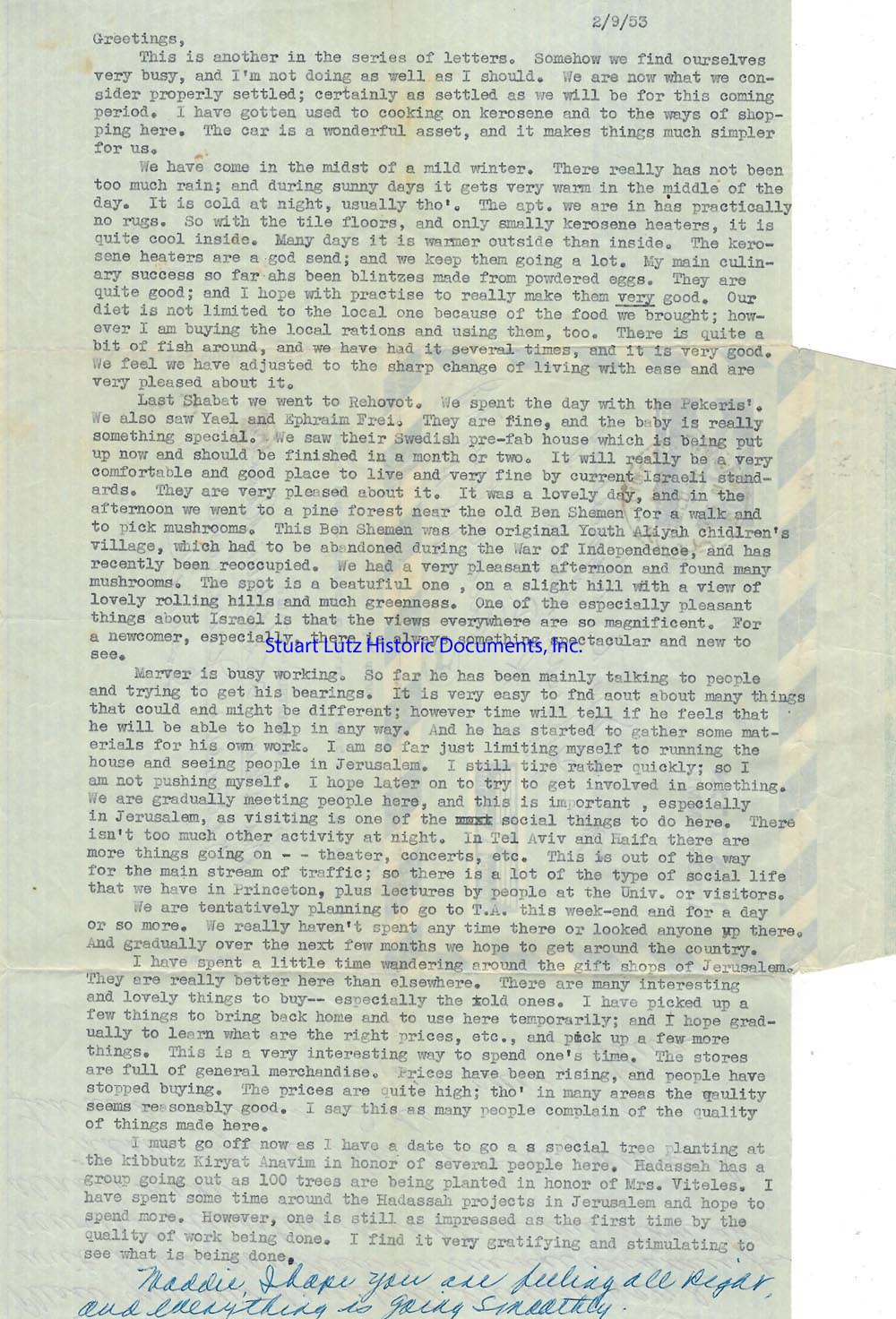
|
|
| |
| |
 (LOUISIANA PASSPORT) (LOUISIANA PASSPORT) |
|
|
|
|
| |
Price: $400.00 |
Stock# 6238 |
| |
SPANISH PASSPORT INTO LOUISIANA THE YEAR OF THE LOUISIANA PURCHASE
HUGO PEDESCLAUX (1751-1834). Pedesclaux served as consul of Spain at Bordeaux from 1796 to 1808.
DS. 10” x 12”. August 27, 1803. Bordeaux. A partially printed document signed “Juan Estrada” in Spanish; the translation states: “DON HUGO DE PÉDESCLAUX commanding Commissary for His Catholic Majesty’s Royal armies and the trade of the nation of Spain in the Department of Gironde and its vicinity, residing at Bordeaux. Whereas I have deemed it beneficial to the King’s service to grant free and secure passage to Don Antonio Ignacio Silva, a resident of Louisiana 32 years of age, 5 feet 4 inches in height, eyes brown, eyebrows the same, hair black, nose bulbous, mouth regular, and complexion dark; the said individual arrived in this port with the rank of second officer on the Spanish merchant frigate named La Eugenia, and is returning to Spain by leave of his Captain Don Luis Dauquemenil on the chasse-marée El Santo Ángel de la Guarde, Don Martín de Ybarra master; having as his companion a youth named Jacinto León, a native of New Orleans and arriving on the aforesaid frigate La Eugenia; I therefore pray and beseech the Lords Governors, Judges and Peace Officers in the places through which he may travel to impose no obstruction to his journey, but rather to afford him whatever favor and assistance he may require to continue. To this end, I have granted the present passport signed by my hand and sealed with the Royal seal of this consulate”. On the version, the following is written in another hand in reply and signed “Antonio Argote Villalobos”: “Having appeared with this passport at this Consulate of Spain in Virginia, it is granted him to take passage to Louisiana on the vessel that suits him Norfolk, 14 December 1803”. This document is a passport for Don Antonio Ignacio Silva to enter the colony of Louisiana on the orders of Don Hugo de Pedesclaux, the Spanish consul in French Bordeaux. It was issued during a time of great transition for Louisiana, as it had just been purchased from France by the United States in the Louisiana Purchase. In return for fifteen million dollars, about eighteen dollars per square mile, the United States acquired 530,000,000 acres from France. Napoleon had hoped to re-establish a French colonial empire in North America, as they had in the 18th century. France had only reacquired some of that territory, the Louisiana Territory, from Spain in 1800, having lost it in the Seven Years War in 1762 (and explaining how a Spanish citizen like Silva could have lived there for so long). However, France's failure to suppress a revolt in Saint-Domingue, now Haiti, plus the prospect of European warfare, prompted Napoleon to sell off France’s North American possessions. Given that this document makes no mention of American control at either date and given how slow communication was in the early 19th century, it is likely that none of the parties to this document knew of the Louisiana Purchase. In fact, France would not turn over New Orleans, their colonial capital, until December 20, 1803, after both signatures; and this was only three weeks after Spanish officials had belatedly formally turned over administration of the colony to France! The intertwined early 19th century histories of France and Spain would affect Pedesclaux. When Napoleon put his brother, Joseph, on the Spanish throne in 1808, Pedesclaux defected and swore loyalty to Joseph. He was not pardoned by Spain for this action until 1833. The document is in very good condition with some minor stains and folds. An English-language translation is included. |
6238
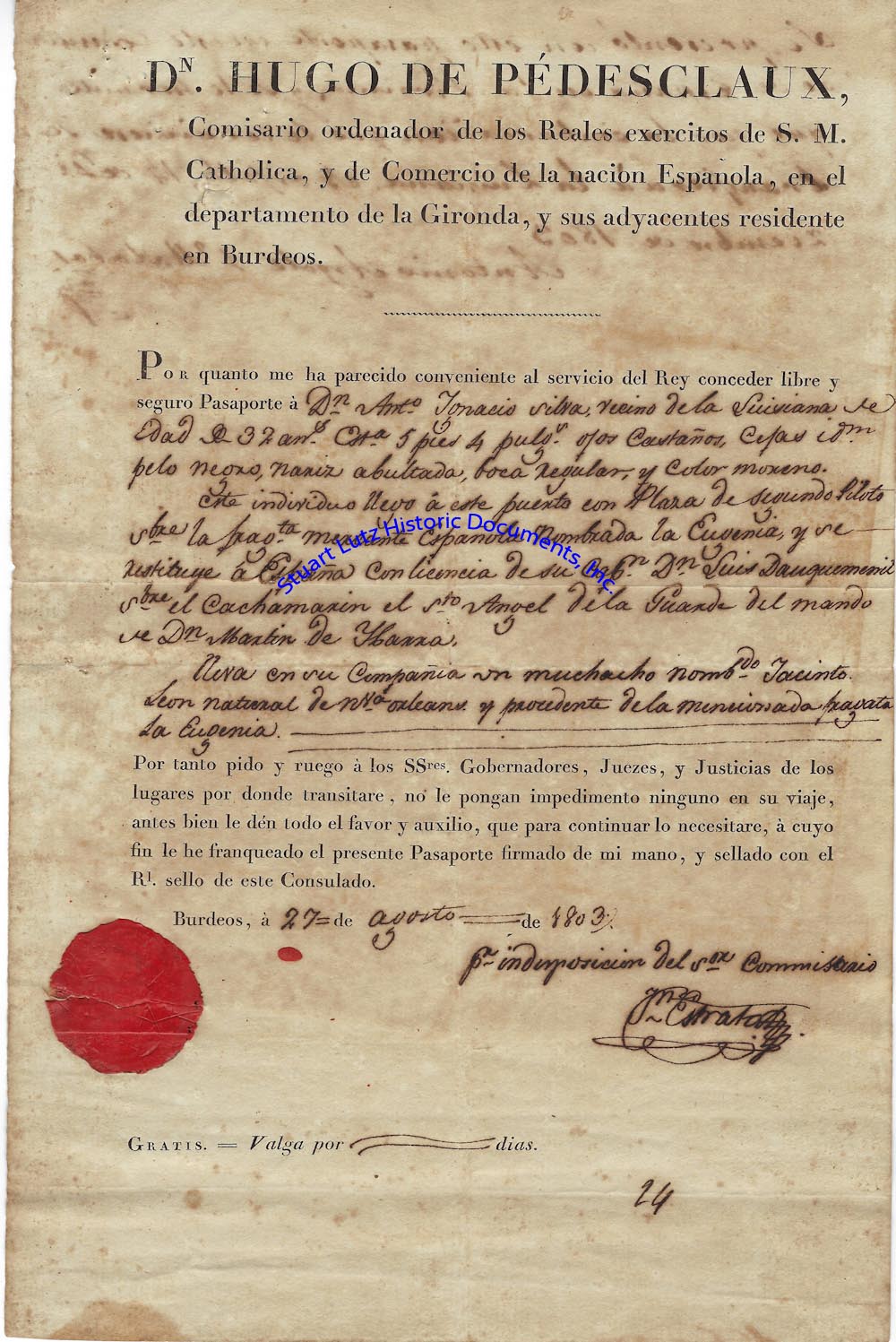
|
|
| |
| |
 (LUCIAN) (LUCIAN) |
|
|
|
|
| |
Price: $150.00 |
Stock# 2458 |
| |
A PAID SUBSCRIPTION FOR A BRITISH TRANSLATION OF LUCIAN
DR. THOMAS FRANCKLIN (1720-1784). Franklin, an English publisher, was a translator of Sophocles, Phalaris, and Lucian. He also wrote two tragedies, the Earl of Warwick and Matilda.
DS. 1pg. 5 ¾” x 2 ¾”. Jan 29 1774. No place. A partly printed document signed Tho Francklin” acknowledging that he “RECEIVED of the Revd Edward Gregory the Sum of One Guinea, being the first Payment for one Copy of the Translation of Lucian.” Lucian was a famous satirical Greek author. Francklin’s two volume The Works of Lucian, from the Greek was finally published in 1780. The Reverend Edward Gregory was from Langar, England and he discovered a comet in 1793. The document is laid down to a larger sheet and is in fine condition. |
2458
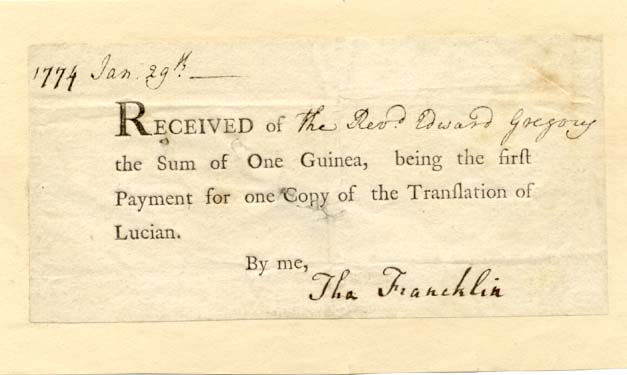
|
|
| |
| |
 (MAGNA CARTA) (MAGNA CARTA) |
|
|
|
|
| |
Price: $3,000.00 |
Stock# 6133 |
| |
A SILVER FACSIMILE OF THE MAGNA CARTA, ONE OF THE LANDMARKS OF WESTERN LAW
(MAGNA CARTA). The Magna Carta, signed in 1215, was an agreement between King John and rebel lords who were angry with the king’s unchecked powers. The legal document agreed that the King was not above the law, Royal officials had legal limits and established the freedom of the church.
Silver facsimile. 1977. London. A silver facsimile of the Magna Carta and the double-sided seal of King John. This artifact was produced in 1977 by Louis Osman, a famous English silversmith and goldsmith. The text is raised and it is mounted onto an orange leather backing. It is further contained in two custom boxes, along with a space for the King John seal. There were supposed to be 500 replicas made, and this is number 118, as marked in the lower right corner. The British government loaned one of the four known Magna Cartas to the United States in 1976 in honor of its Bicentennial. Osman made the custom case that held the Magna Carta while in America. The next year, Osman created this silver facsimile. Osman also made a separate Magna Carta facsimile that is permanently located in the United States Capitol crypt. The silver facsimile is based on one of the two Magna Cartas held in the British Library, known as the Cototn MS Augustus II.106. The artifact has some silver tarnish on it (although the overwhelming majority has been removed) and the custom box has a few nicks and faults. An unusual memento of one of the great legal documents of the West. |
6133
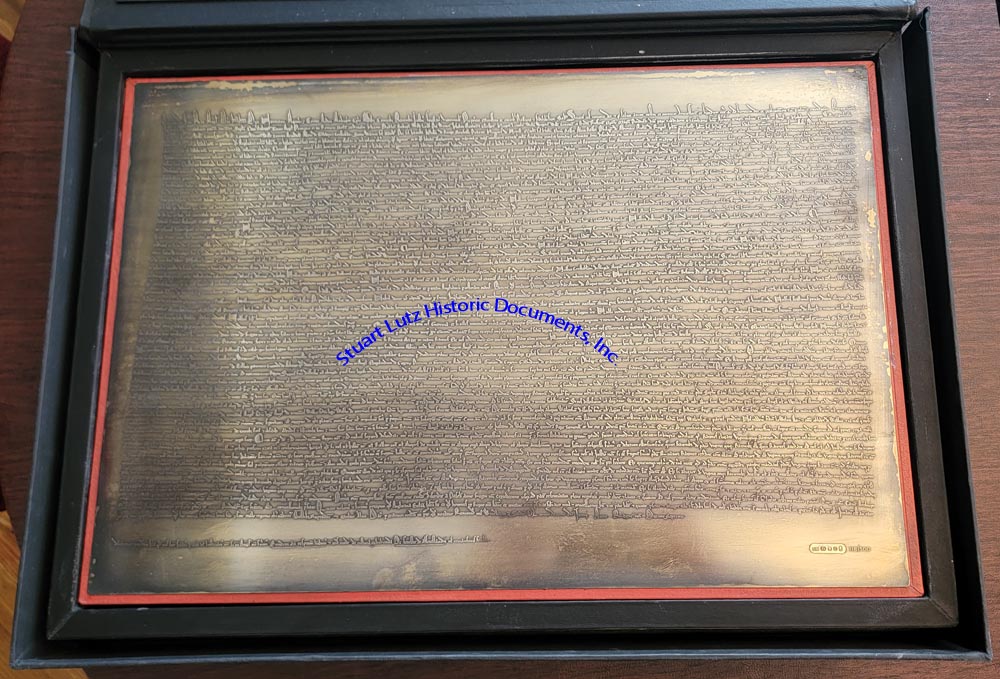
|
|
| |
| |
 (MEXICO) (MEXICO) |
|
|
|
|
| |
Price: $400.00 |
Stock# 5281 |
| |
AN EARLY MEXICAN LETTER IN WHICH A MAN INVITES A PRIEST TO TRAVEL FROM MEXICO CITY TO CHRISTEN HIS GODSON
(MEXICO). ALS. 1pg. 6” x 8”. December 5, 1766. Tlayacapan [Mexico]. An autograph letter signed “Nicolás Morquecho” addressed “To our most Reverend Priest Señor and my very dear friend Gerónimo”. Morquecho wrote: “The day has come for you to honor me with your arrival, to do us the favor of christening your godson. My friend Juan Francisco de Ariza has now come from Mexico [Mexico City] and today is the day we have set to baptize our son. I hope that you will fulfill your promise, which you made to me eight days ago. The delay [of the baptism] is due to my friend, who has now arrived. We are waiting now for your arrival, by the time, or before, the sun sets. I will be delighted to find you enjoying the excellent health that my heart desires for you on this day. I offer all that I have, hoping that you will let me know of anything you desire, so that I, with great affection, can best serve you. With this, praying that you will oblige me with this favor, knowing your importance, May you be able (to fulfill your word), December 5, 1766 Your friend and mentor, who kisses your hand and through Christ loves you, Nicolás Morquecho”. The verso states “To our Most Reverend Priest Señor and Beloved Brother, my highly esteemed Godfather Brother Gerónimo”. The paper has a few small, round insect holes and the top margin has darkening. |
5281
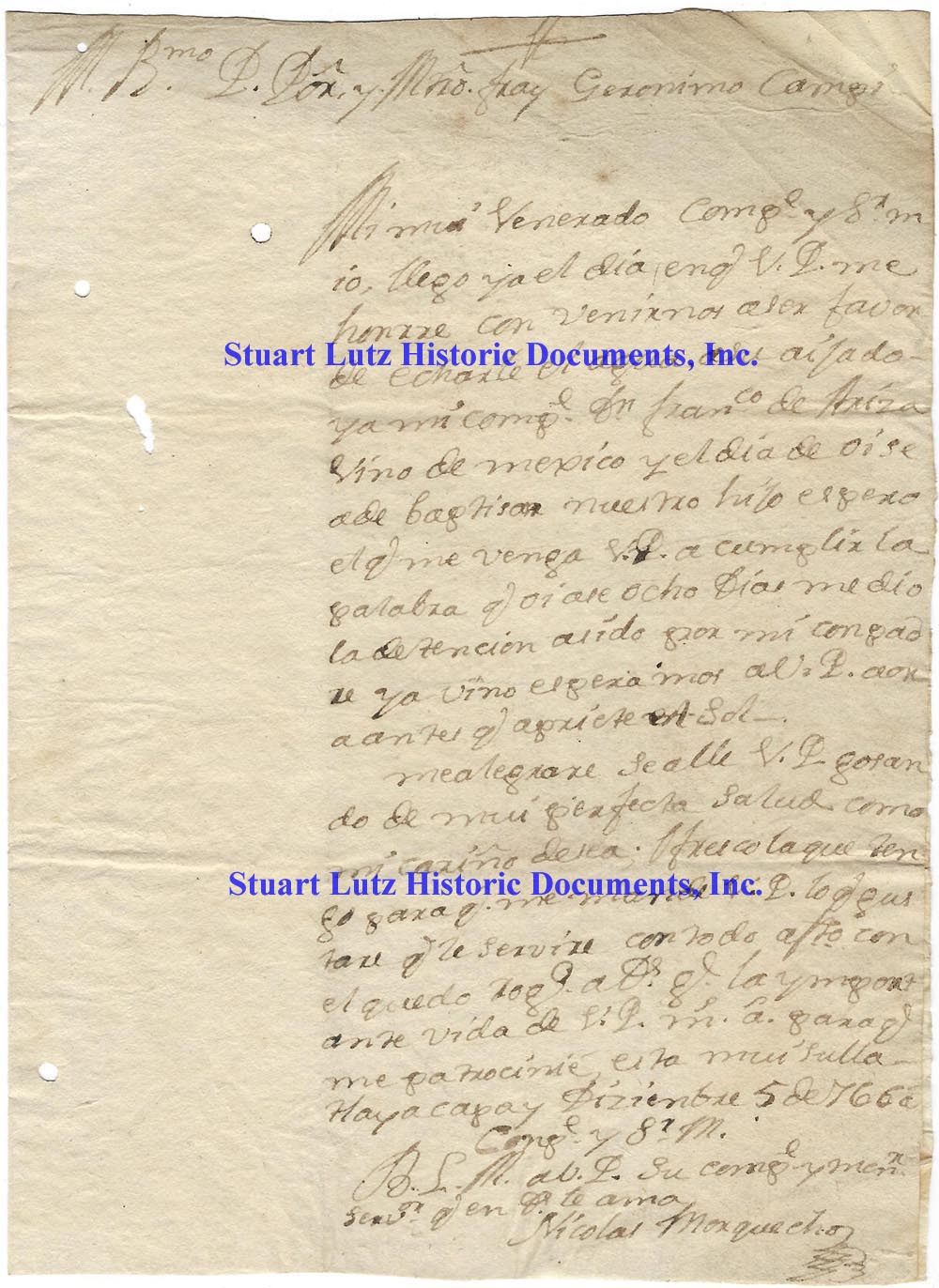
|
|
| |
| |
<Previous 6> <Next 6>
|
 |
